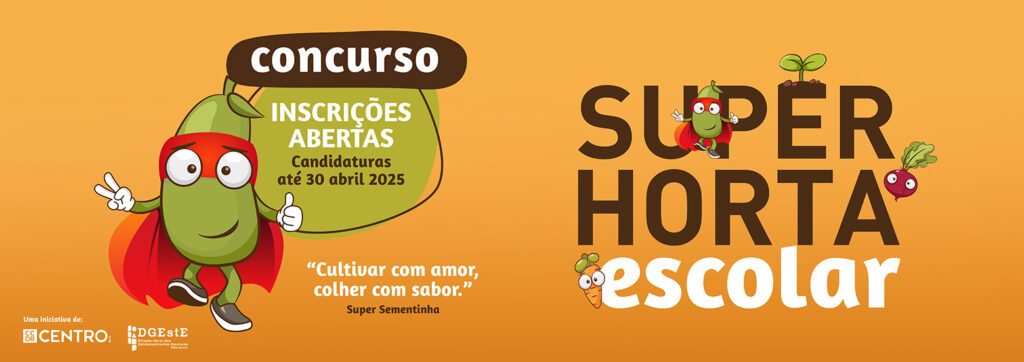The Centre Regional Coordination and Development Commission, I. P. (CCDR Centro) organised and promoted the Regional School Garden Competition, which was widely publicised on social media and in the press.
The competition aimed to highlight school gardens as a valuable pedagogical tool for promoting learning, appreciating agriculture, and fostering a deeper connection with rural life. By encouraging the social recognition of the primary sector among young people, the competition also serves as a stepping stone toward valuing agriculture as an important economic activity that can revitalise rural communities.
The Directorate-General for School Establishments (DGEstE) in the Centre Region supported the dissemination of the competition among schools, while the Escola Superior Agrária de Coimbra (ESAC), a higher education institution specialising in Agriculture, graciously offered its facilities for the final awards ceremony. This partnership also aims to stimulate young people’s interest in agriculture and rural life, potentially encouraging them to pursue higher education in these fields in the future.
Objectives of the Regional School Garden Competition:
- Learn concepts of environmental and nutritional education, promoting the adoption of good eating habits.
- Produce food that can supplement the students’ diet.
- Work on the process of growing food and all the variables involved.
- To raise awareness of the importance of organic food, not just because of the health aspect, but because it can be grown by small producers.
- Valuing teamwork, cooperation between students and responsibility.
- Using the vegetable garden to develop the application of different subjects, such as science, geography, maths and languages.
To further engage students, the CCDR Centro communications office designed a mascot for the competition called ‘Super Sementinha’ (translated as “Super Little Seed” in English).
Application and Award Categories:
In April 2025, an online submission form was made available for pre-schools and primary schools to apply for the competition. Applicants were asked to answer questions regarding the crops grown in their school gardens, cultural practices, and other relevant details, along with submitting photographs and a garden layout.
In May 2025, a competition jury assessed the submissions and awarded prizes based on the competition’s regulations, for each level of education (pre-schools and primary schools), with the following award categories:
- Most Sustainable Garden – For schools that adopt ecological practices such as composting, reusing materials, and growing native species.
- Most Community-Involved Garden – Recognising the garden that encourages the active participation of students, teachers, parents, and the local community.
- Most Diverse Garden – Honouring the school with the greatest variety of crops and efficient use of space and production.
On June 26, 2025, the final award ceremony for the winning schools took place at the Higher School of Agriculture of Coimbra (ESAC_IPC), an important agricultural higher education institution in Coimbra.
Key Outcomes and Future Plans:
The 1st edition of the competition received 46 applications in April 2025. This initiative underscores the importance of raising awareness among the school community and society at large about the value of organic food, the potential for small producers to grow it, and issues like food security.
The competition has clearly sparked enthusiasm among participating schools, which see it as an opportunity for their efforts in creating and maintaining school gardens to be formally recognised.
However, due to the competition’s launch in April 2025, it was not possible to visit the gardens in person. For future editions, site visits will be implemented to maintain the momentum and further recognise the hard work of students, educators, and teachers.
For more information, please visit https://www.ccdrc.pt/pt/super-horta/

